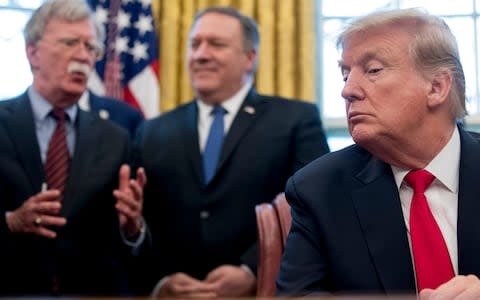John Bolton, foreign policy hawk, in spotlight as tensions with Iran and Venezuela escalate

Just hours after being named Donald Trump’s new national security adviser in March 2018, John Bolton offered a glimpse into his world view when tracked down by Sky News.
“The surest way to avoid conflict is to have a strong military capability,” Mr Bolton said when asked if more clashes were to come between America and its foes.
“As the ancient Romans used to say: Si vis pacem, para bellum - if you want peace, prepare for war."
More than a year on, critics and commentators looking for an explanation for America’s forward-leaning foreign policy in areas of growing tension have pointed the finger at Mr Bolton.
The mustachioed foreign policy hawk, who was once George W. Bush’s United Nations ambassador, is playing a central role in standoffs that have dominated headlines in recent weeks.
When the White House announced the USS Abraham Lincoln, an aircraft carrier, was being deployed to the Middle East amid fears of an imminent Iranian attack it was Mr Bolton’s name on the statement.
When Venezuela’s opposition attempted a military uprising to topple the embattled president Nicolas Maduro, it was Mr Bolton who publicly called out Maduro allies allegedly backing the plot to help trigger his removal.
Further back it was Mr Bolton who lobbied to scrap the Intermediate-Range Nuclear Forces Treaty [INF] between America and Russia over fears it constrained Washington while being violated by Moscow. In February it was suspended.
How much were these decisions down to Mr Bolton? Assessing his influence, the differing camps in the Trump administration and the president’s own thinking from the outside is tricky.
Yet it is noticeable that Mr Trump, someone who campaigned on a non-interventionist platform in the 2016 election, decrying the Iraq invasion and pledging to bring US troops home from the Middle East, has recently talked up the possibility of military action in Iran and Venezuela.
The man Mr Bolton replaced, the stiff general H.R. McMaster, certainly appeared willing to curb Mr Trump's instincts if insider accounts of the time are to be believed, clashing with the president and urging caution over ripping up the Iran nuclear deal.

There have been reports that Mr Trump has grown frustrated by Mr Bolton's interventionist approach in Venezuela, where four months of US lobbying for Mr Maduro's fall has failed to bring it about.
Some former White House advisers certainly see Mr Bolton's hand in recent foreign policy decisions. Steve Bannon, the former White House chief strategist, told The Daily Telegraph: “Trump is the anti-neocon, which is the reason the 'Never Trump' faction hate him.
“Bolton has been a solid national security adviser, but the president's instincts are spot on in pushing back against the adventurism shown in Venezuela.”
Another ex-White House official under Mr Trump called Mr Bolton’s views on the Middle East and military action “almost 180 degrees" away from those of the president.
Mr Bolton himself has always waved away questions about his views expressed before taking the job – such as the need for regime change in Iran, which is not US policy – by saying he is here to enact Mr Trump’s stances and not his own.
Last week, the president himself admitted that behind the scenes Mr Bolton was a hardliner. “He has strong views on things, but that’s okay,” Mr Trump said. “I actually temper John, which is pretty amazing isn’t it?”
But he insisted that, in the end, he was boss. “I have different sides,” Mr Trump said. “I have John Bolton and I have other people that are a little more dovish than him. Ultimately, I make the decision.”

